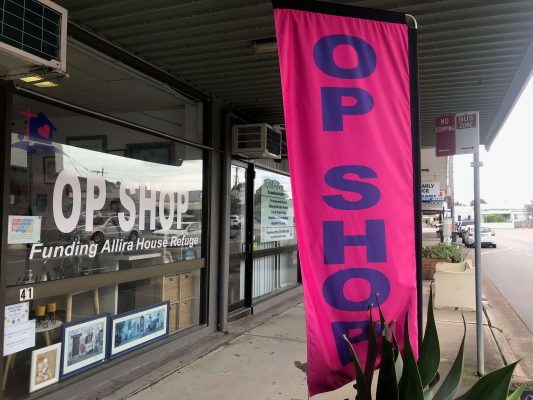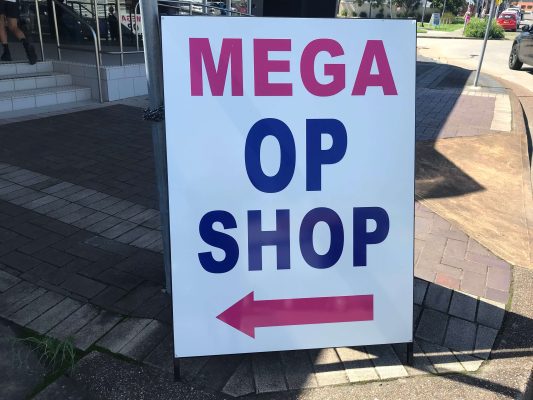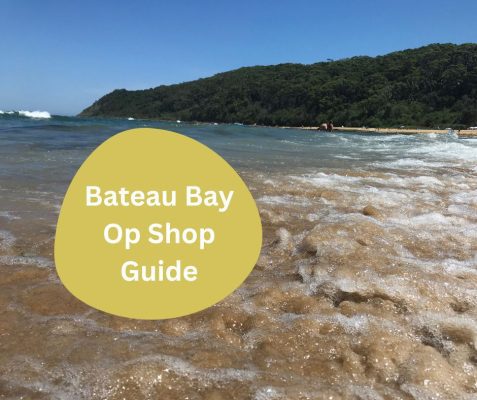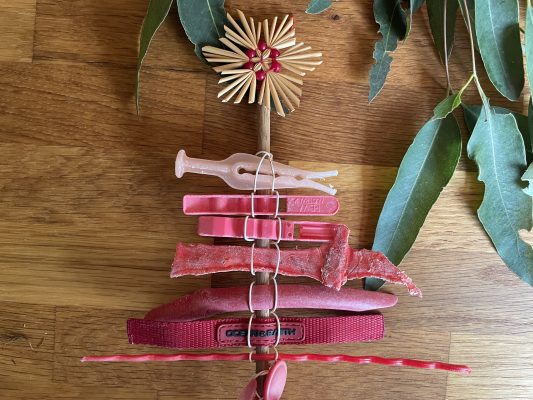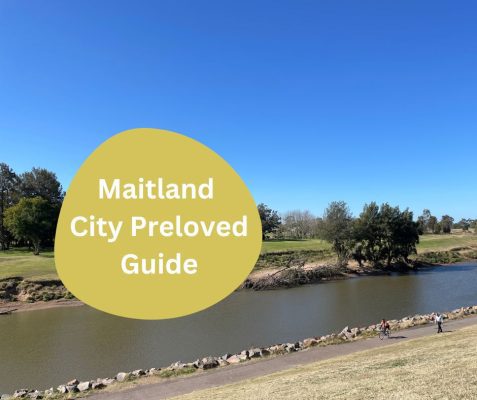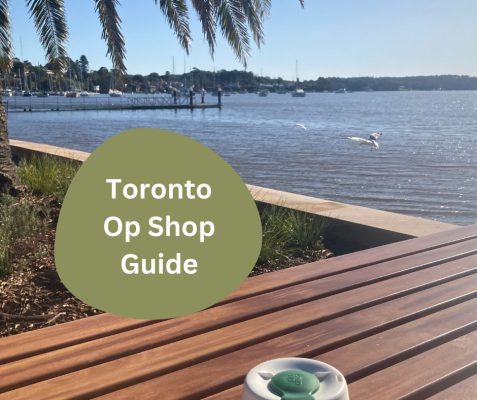Community, Neighbourhood Livability, Reduce & Reuse
Behind the Op Shop Donation Door
This article is a summary only of the podcast conversation “Ep 2: Behind the Op Shop Donation Door” featuring Dalys Harper and David Ison from Lifeline Direct Australia. Listen here to the full episode on Spotify podcasts or Apple podcasts, and go here for the relevant links mentioned in the podcast, or read on to enjoy the photos and summary about the benefits, challenges and surprises of op shops.
Behind the Op Shop Donation Door
When you’re decluttering the house or having a clear out, donating to your local op shop is a great first choice. Donating your stuff gives you the feel-goods, knowing the op shop will sell your stuff to help others. But what really happens behind the scenes of the op shop donation door?
Discover how op shops are better for your budget and the planet as well as how supporting preloved first has a positive impact in your community.
Sorting the Donations
All donations brought to the store are firstly checked for quality to see if they meet the shop’s needs and fit within its space. The goal is to keep as many good quality items in the shop as possible.
Otherwise, excess or lower-quality items are sent to the regional warehouse for redistribution to other Lifeline stores.
Whenever possible, the shop aims to keep donations local to respect the donations that are given by the community for the community to purchase.
Pricing the Donations
The goal is to price items reasonably so they sell quickly and help raise funds for the op shop’s cause. Staff have a pricing guide plus will research items to determine a fair and realistic price, ensuring it’s affordable for buyers whilst also acknowledging the donation’s value.
Non-Saleable Items
If an item doesn’t sell in one store, it’s moved to another location within their network of stores across Newcastle, Central Coast, Hunter, and Port Stephens. Different products and prices can sell better in other locations, which is why donations are regularly transferred. This maximises the value of donations and gives customers at all stores a diverse selection of items.
What is Quality?
When it comes to determining the quality of donations, it’s easy to start with the obvious. These are items that are clearly damaged such as ripped and stained clothing. Or overly worn items that no one would buy with visible wear-and-tear or pilling.
The second step is deciding whether the item can sell in the current store or if it’s better suited for a different shop. For example, fast fashion items, which are harder to sell at higher price points, are often set aside for warehouse clearance sales. These sales give shoppers a chance to buy in bulk, offering opportunities to upcycle items into new creations like cushions or curtains.
For Lifeline, the community response to warehouse sales has been overwhelmingly positive, showing that people appreciate the opportunity to give items a new life.
Dalys has been working in op shops for years and believes the quality remains the same, but the biggest shift is in the sheer volume of donations. Many people now sell their higher-end items online first, leaving fewer premium pieces for the op shops.
Clothes for Export
If the item doesn’t meet the quality standards for the store or warehouse sales, the shop moves to the next step. The store has a relationship with a national supplier, called One Ten Enterprises. Unsellable merchandise is popped into bales for the company to collect, who then export the bales overseas, where it’s recycled into other products.
Here’s a quick calculation: A bale of clothes weighs approx 160kg. In the Hunter region, Lifeline’s warehouse estimates they fill about 50 of these bales each month with unsellable clothing. When you consider the number of retailers that use this service, you can get a sense of the amount from across Australia. And that’s only for non-saleable preloved.
Textile waste is a really significant issue. Op shops are inundated with clothing.
Local Reuse First
In July 2024, Lifeline Toronto launched an office space within the store to run upcycling workshops as well as a mend-it space. That’s this op shop’s small step to help keep it within the community. All with the help of the shop’s volunteers.
At a network level, Lifeline constantly looks for opportunities to reduce their impact on the environment. They’re aware of local organisations like Upcycle Newcastle, who use discarded clothes and fabric scraps as stuffing for handmade cushions. Initiatives like this highlights the real potential for repurposing clothing that’s beyond their last chance and use “reuse” meaningfully.
Talking Fast Fashion
The sheer volume of clothing – especially fast fashion – the op shops receive through donations is crazy. In the words of Dalys,
“If people actually saw the amount (of clothes) they might stop and think about when they are purchasing from those big global fashion brands. There’s enough clothes already in existence to clothe the next six generations”
Prior to working with Lifeline, David spent three decades working in a large discount department store. Whilst working with the company, he didn’t really understand the size of the problem or the challenge that op shops are confronted with. In that company, it was all about selling as much as possible.
David emphasised Dalys’ earlier comment about the volume of merchandise coming into op shops that’s been purchased for a small price, worn a few time to then become unwearable is a real challenge. Especially because a significant percentage is unsaleable.
This is where relying on external contractors who shred and send clothes overseas for recycling comes into action.
Why Can’t We Recycle in Australia?
Lifeline would love to support recycling initiatives in Australia, but this is currently not possible with the scale of clothes that aren’t saleable. If it wasn’t for organisations like One Ten Enterprises, container loads would potentially be heading to landfill in Australia.
Biggest Misconception about Op Shops
The biggest misconception is that op shops are for people who are economically disadvantaged. But the greater message is that op shops are a preloved store for a huge range of people in the community – from fashion conscious teens, the budget conscious and the environmentally conscious.
Quirky & Classic Finds
You never know what you can find at an op shop! Filled with something different at each visit, op shops are your go to place for finding something quirky, unique, classic, vintage, retro, and childhood-memory inducing.
Surprising Donations
Lifeline Toronto received a beautiful painting, donated to them as a deceased estate donation. Store Manager Dalys reached aout to the artists who’s an Australian artist living in Tuscany. It’s a $6000 value painting!
And then there are the mystery items that nobody actually knows and may never get resolved.
Op Shops Support the Organisation’s Mission
Lifeline shops have been around for a little over 30 years and started as another source of revenue to support their suicide prevention initiatives and crisis support services. Op Shops are another opportunity for Lifeline to give back to the wider community.
Volunteers at the Heart
Volunteers are the backbone of an Op Shop operations. Lifeline Toronto has nineteen volunteers that bring a variety of skill sets, passions, knowledge, and fun. Dalys believes it’s the combination of volunteers and shop managers that add personality to the four walls to make it a unique shopping experience.
Best Tips for Donating
If you wouldn’t give it to a mate, don’t donate. Which means that if you wouldn’t give it to a family friend, it’s probably not something that could sell in op shops.
Bring your donations in either reusable grocery bags or cardboard boxes, as they can be used again. You can even bring things in your own bag that you want to keep, as the op shop will happily empty and give it back to you.
Charitable Recycling Australia
In June 2024, Charitable Reuse Australia released the Measuring Reuse and Activity Impacts for NSW report. David said the report confirms exactly what they see in the op shops – which highlights the types of product and kinds of customers coming to the op shop, as well as a greater level of sustainability awareness. The report also emphasises how volunteering plays an important part to society as a whole.
A Real Positive Impact
Donating an item to an op shop or purchasing an item from an op shop or volunteering your time to an op shop, not just ours, but any one of the different providers across the country is a great opportunity to give something back and have a real positive impact on community and environment.
The ReNewy Living Podcast was recorded on Awabakal country. I wish to acknowledge the traditional owners of the land and waters in the Newcastle and Lake Macquarie region of New South Wales.
I hope you’re feeling more confident about doing better for our people and planet by taking a start where you live approach to living sustainably. If this episode has spurred you into action, please feel free to share it with your friends. It would mean the world to me!
Listen into the stories and voices of this story here at Spotify podcasts and here at Apple Podcasts… And you can also sign up to my regular emails here… I look forward to sharing more stories with you next time.
Ep 2 Behind the Op Shop Donation Door
Links from the Podcast episode
- Lifeline Direct (Hunter)– Lifeline Shops help to fund life saving services though the sale of pre-loved goods
- Lifeline Toronto – Lifeline Shops help to fund life saving services though the sale of pre-loved goods
- Lifeline Australia – Australia’s leading suicide prevention service.
- Upcycle Newcastle – a local community group dedicated to the circular economy and reducing textile waste by promoting creative reuse and repair.
- One Ten Enterprises– reducing landfill by facilitating the reuse of textiles
- Charitable Reuse Australia– national network of charitable purpose-driven reuse enterprises
- Awesome Newcastle
Other Relevant External Links
- Foreign Correspondent episode Dead White Man’s Clothes: The Environmental Disaster Fuelled by Used Clothes and Fast Fashion
- Textiles Waste in Australia: Reducing Consumption and Investing in Circularity – The Australia Institute (May 2024)
- The Centre for Volunteering
Relevant Blogposts with ReNewy Living
- Head to the Newcastle Region Op Shopping Search Guide to see if there’s an op shop near you.
- Hot Tips for Op Shopping Mindfully…
- 5 Unique Guiding Principles for Op Shopping…
Stories, News & Voices
Sharing stories that strengthen our commitment to nature, community, and a healthier planet.










